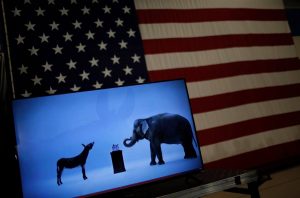
At the time of the writing of this article, there is still no clear winner of the presidential election. But even at the time the final results are officially declared, still there will be no winner unless his aim is to unify the nation. Why? Because when the country is split into two pieces, one side overpowers, annuls, disqualifies, and overshadows the other. This cannot be called a real democracy, a concept that by definition must include and embrace the plurality of opinions.
So, as the situation looks now, is it possible to prevent a clash between the two fronts? No, it’s impossible. But America is not the exception. The same is relevant in every country and any society in the world because the distinctly opposite poles in people’s perspectives stem from human nature. Each side wants to prove that it is right and the other is completely wrong, an attitude that destroys any chance of reaching a civilized understanding. It would mean rejecting the basic premise that everything in reality has the right to exist even if it has opposite qualities. Similarly, everyone’s point of view should be considered and valued, even of those whose thoughts or upbringing are radically different from our own.
The best school for understanding politics and any model of human interaction that may actually work for people, for all people, is the jungle. Literally. For instance, who is right in the wild, the wolves or the sheep? Actually, both. Wolves and sheep have always existed side by side in a common space. Never have the wolves eliminated all the sheep at once; they only feed on what is essential for their survival. It is true that if we look at this particular action without considering the whole picture of nature, one eats the other, and therefore the strongest survives. But the principle here is that what we judge as weak or strong is not classified by nature as such, it simply considers every element as essential. This way, nature maintains its balance by making sure that every part within its system is important and serves a purpose.
If that were not the case, evolution would have left alive only powerful species. Yet for thousands and millions of years the weak have been preserved by the laws of nature through ongoing reproduction, sustaining their place in creation.
On the other hand, human history shows us that the strong are not forever kept in an advantageous position. Empires have risen and fallen one after another—the Roman Empire, the Austro-Hungarian Empire, the rule of the Egyptians, Greeks, and Turks—because nature evolves according to its general plan depending on what is needed for the overall general benefit at that particular moment in time.
One may ask how could a “middle line,” in which opposite views can converge and harmoniously coexist, possibly be built in such a divisive and hostile reality as in America? How could we possibly establish a society where no one belittles the other and instead everyone finds a place to freely express his views, finding a common ground of mutual respect and consideration?
It is clear that the path we have used to build our societies—based on cruel competition and in disregard for one another—has provided a breeding ground for endless conflicts. Therefore, it is necessary to establish a new mechanism for inclusiveness that would be implemented by the elected leadership while listening to people’s voices and demands, paying careful attention to the grassroot needs regardless of their political preferences, a government that would represent everyone under one shared roof called the United States of America.
The current breakage that is now being revealed in US society is actually a unique opportunity for all to realize that there is no way to survive and thrive unless the country unites. In a perfect world, under the current circumstances of razor-thin margins of the American electorate, the nation shouldn’t have to be led by only one direction. The leading figures of the two political parties should have to gather to find joint decisions on the most pressing issues affecting US society.
But that is wishful thinking. The implementation of this kind of process would require an education based on the integral system of nature in which the balance point is reached precisely through considering opposites—small and large, solid and liquid, cold and hot, negative and positive. When the opposites rise above their disagreements and differences a special common force is revealed which forms the middle line, meaning the common area created to sustain the right functioning of any system in nature, the social system being one of them.
This may now sound like an utopian goal. It is at the moment, but sooner rather than later, both Donkeys and Elephants will realize they are not meant to act according to visceral instinct, devouring each other like other species do to achieve balance. On the contrary, human beings are meant to understand that they will need to get closer, not because they profoundly love each other, but because the alternative is an unbearably explosive situation of constant struggle. Thus, it is in our common interest to overcome our differences to find the joint force to survive and thrive.